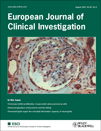Immunoadsorption in dilated cardiomyopathy: long-term reduction of cardiodepressant antibodies
Abstract
Eur J Clin Invest 2010; 40 (8): 685–691
Background Disturbances of humoral immunity have been described in dilated cardiomyopathy (DCM), and a number of antibodies against cardiac cell proteins have been identified. Previous studies showed that immunoadsorption therapy with subsequent IgG substitution (IA/IgG) enhances cardiac function, and that removal of cardiodepressant antibodies may represent one essential mechanism of this therapy. The long-term effect of IA/IgG on the level of cardiodepressant antibodies remains to be elucidated.
Methods A total of 17 patients with DCM were observed up to 12 months after IA/IgG. Echocardiographic measurements were performed at baseline, 3, 6 and 12 months after therapy. Cardiodepressant antibodies were detected by incubation of rat cardiomyocytes with purified patients’ IgG and recording of contractility and Ca2+ ratio.
Results In contrast to patients without cardiodepressant antibodies before IA/IgG, patients with negative inotropic antibodies showed an improvement of left ventricular ejection fraction (LVEF) from 33·8 ± 1·7% to 44·7 ± 2·7%; 44·5 ± 2·3% and 51·8 ± 1·7% after 3, 6 and 12 months (P < 0·001 vs. baseline, P < 0·05 vs. LVEF of non-cardiodepressant group). Immediately after IA/IgG therapy, no cardiodepressant effects of patients’ IgG on isolated cardiomyocytes were detectable, and this effect remained diminished until 6 months after IA/IgG (P < 0·001 for contractility and Ca2+ ratio). Compared with the levels after 3 and 6 months, cardiodepressant antibodies reoccured after 12 months (P = 0·067 for contractility, P < 0·05 for Ca2+ ratio vs. 6 months after IA/IgG). However, the negative inotropic reaction is still diminished compared with the reaction before IA/IgG.
Conclusion IA/IgG therapy induces long-term reduction of negative inotropic antibodies. After 12 months, however, re-increase of negative inotropic antibodies cannot be excluded.




